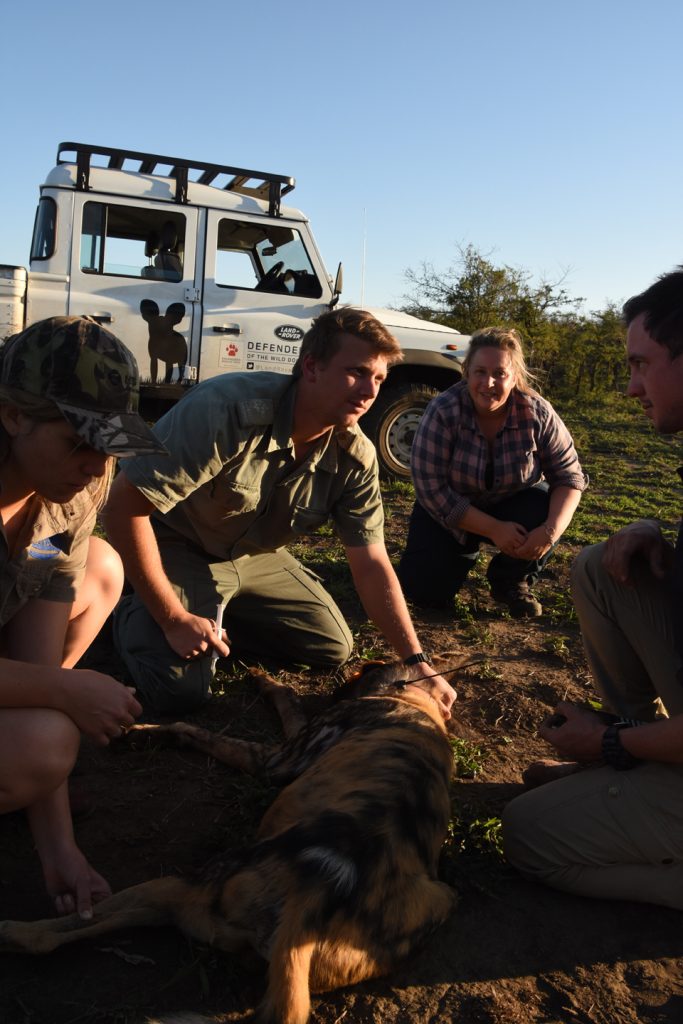
Research Project Title: “Indicators of pack cohesiveness and degree of social integration in the African wild dog (Lycaon pictus) and its relevance to population management and recovery”
The African wild dog (Lycaon pictus) also known as the painted dog, painted wolf or cape hunting dog is considered one of the most highly endangered carnivores in Africa (IUCN, 2012). As a result, there are extensive ongoing conservation efforts, including both in situ and ex-situ breeding programmes, which aim to increase the population size and genetic diversity.
Social animals such as African wild dogs, live and interact together forming complex relationships and social structures (Wey et al., 2008). Understanding the social behaviour and group structure of African wild dogs is essential in both in situ and ex situ management because they can affect growth rates, access to resources, selection of sexual partners and inbreeding avoidance, development of cooperative behaviour and disease transmission (Croft et al., 2011; Strier, 1997, Whitehead, 2009). Social behaviour changes throughout an individual’s life, resulting in different social roles at different ages. In addition, individuals may choose to interact differently with others based on their age, sex or kinship (Wey & Blumstein, 2010). Early interactions may influence dispersal decisions or dominance, and certain individuals may ultimately be important for maintaining group stability and structure, and their removal can have profound implications for conservation efforts (McComb et al., 2001; Wey & Blumstein, 2010). African wild dogs are obligate cooperative breeders (Yordy & Mossotti, 2016) and so a full understanding of how pack cohesion and social integration impacts on breeding success is essential for both in and ex situ management. The PhD research project aims to understand the factors affecting pack cohesion both in situ and ex situ and the relationship between social behaviour and the success of conservation efforts.

What inspires you about your research?
I have always had a passion to continue learning with a particular emphasis on research. Growing up, role models within conservation included David Attenborough, Dian Fossey and Jane Goodall, and how through detailed notes, observations and experiments we can learn so much about other species and the environment we live in. I became interested in science later than most, having not taken double science or chemistry A’Level at the time, I was not eligible to complete a zoology degree. However, I did complete a BSc (Hons) in environmental science tailoring my undergraduate research towards animals and the still contentious issue today of badgers and TB. I loved designing the project and having full control over the direction and project management aspects of my research. The results were even more fascinating and this ignited my passion further towards research. I then went on to work and live in New Zealand, returning to the UK as a mature student to complete an MSc degree in animal behaviour to complement my work experience within the industry. I had already researched what I would like to complete as my dissertation a year before commencing my studies
Why did you choose to do a research degree? And why did you choose Manchester Met?
My main reason for completing a research degree is because it has always been a dream, however it is also to prove to myself and others that they were wrong. In 2006, I was involved in a horse riding accident that resulted in a severe head injury. A year of rehabilitation and many specialists, the low points included being told to consider other career options and to face the fact that I may not be able to work again. At the time I was desperate to complete an MSc but was told that this was not possible with the injury to the brain that I had sustained. Like a red rag to a bull, that was the inspiration I needed and in 2011 I was finally able to start. I completed the MSc with Distinction which has given me the confidence to believe in myself. Now the next goal is the ‘dream’ -the PhD, not just for myself and to prove that I can, but because I want to make a difference. I don’t want to just make people less apathetic and care about an endangered species, I want them to change their behaviour and take action. My research and knowledge I hope will not only help the species in terms of putting together artificial packs of African wild dogs that will become reproductive units in time, increasing the number of individuals and genetic diversity, but also make a difference to people and turn concern into action before it’s too late and we lose the conservation battle and the species. Choosing MMU was an easy choice. Having studied here for my MSc between 2011 and 2014, I was aware which supervisors were relevant to my research. In addition, they were also willing to work with external supervisors, as I put together my personal choice of individuals including industry specialists from two other organisations to


